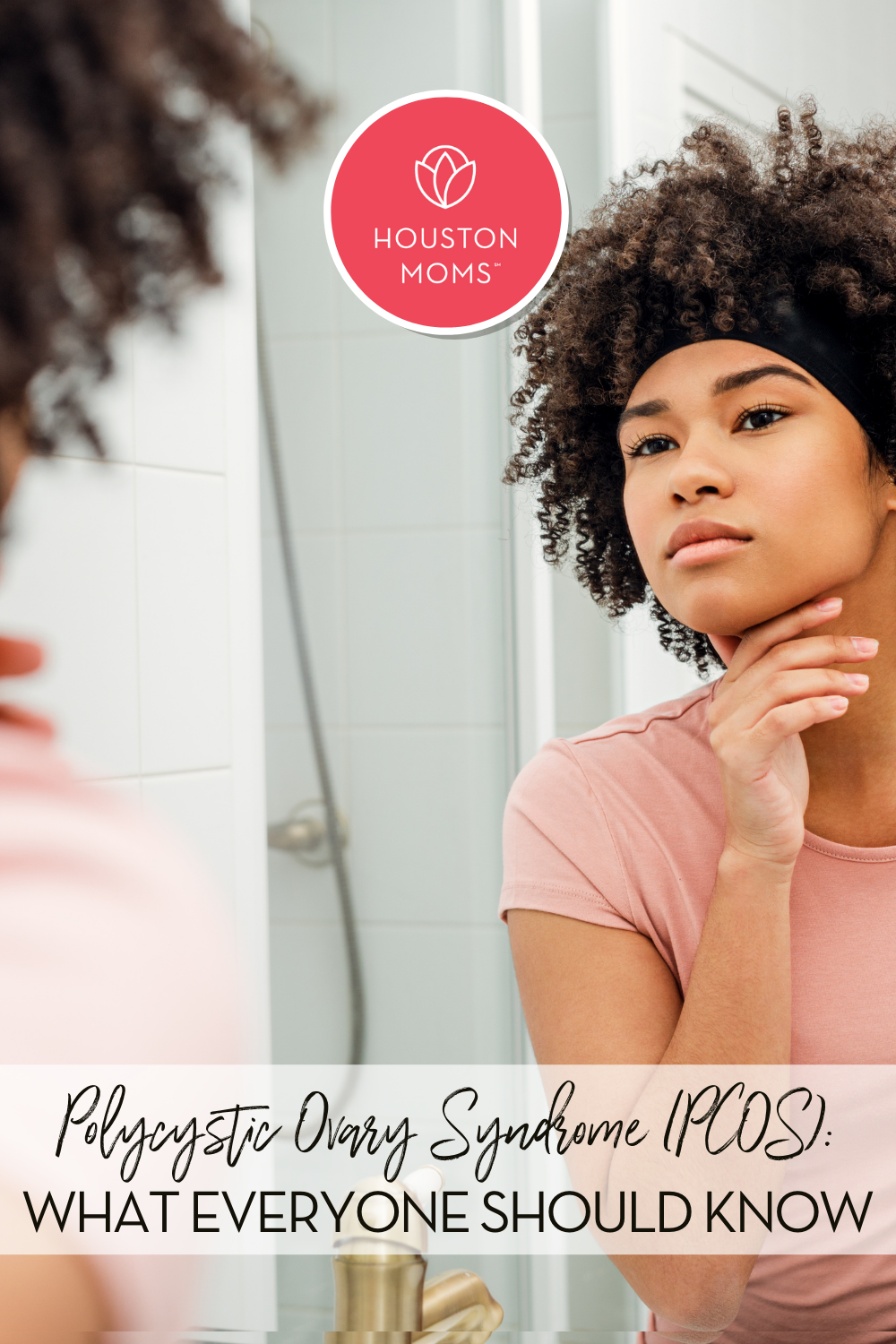Polycystic ovary syndrome {PCOS} is the most common hormonal condition among reproductive-aged women, and yet, there are so many persistent myths and misconceptions around what it is, what the diagnosis means practically, and how to treat it. Since PCOS afflicts roughly 10-15% of women, there is a reasonable likelihood someone you know or love may struggle with this diagnosis – maybe even you! As a specialist in reproductive endocrinology, infertility, and lifestyle medicine, here are a few things I think every woman should know about PCOS:
 What Exactly is PCOS?
What Exactly is PCOS?
Because PCOS is a syndrome, it is a bit of a catch-all diagnosis, and that means that women with very different constellations of symptoms might get the same diagnosis of PCOS. To be more specific, the most current recommendations suggest using the Rotterdam diagnostic criteria to identify the most women with PCOS. Under these criteria, you would have to have at least 2 of 3 signs or symptoms to qualify: (1) irregular cycles without consistent ovulation, (2) bloodwork or symptoms {extra facial or body hair growth, acne, hair loss} showing high levels of hormones like testosterone, or (3) a particular appearance to the ovaries on ultrasound. Despite the name, having a cyst is not necessary to the diagnosis!
What Symptoms do Women with PCOS Experience?
PCOS can affect five main areas of health and quality of life, and every woman with PCOS will have her own unique combination. These include (1) irregular bleeding due to lack of a consistent ovulation patterns, (2) struggles with weight, (3) extra facial or body hair growth {called hirsutism}, hair loss from the scalp, or severe acne, (4) infertility, or (5) mental health. Many folks are unaware of the last one – but the best studies show that rates of anxiety and depression are 3-5 times higher in women with PCOS. It is therefore so critical to include prioritizing self-care and mental health as part of the management plan!
What is the Treatment?
 Often times, this answer is the most frustrating. There is not a simple fix, or even a cure for PCOS. The name of the game is figuring out a management plan that works for you. When I work with my patients on this, we try to identify the key issues going on at any given time, and focus on those. In one’s teens and 20s, the irregular bleeding might be most frustrating, while eventually weight gain or infertility might become more of the key struggle, etc. Everyone’s journey is a bit different. Truthfully, lifestyle, particularly cultivating a low-carb, whole food-based, healthy diet, probably goes the furthest to help with all symptoms, but there are supplementary approaches that can range from supplements and acupuncture all the way to pharmaceutical medications, and in some cases even surgery. Getting regular structured exercise, enough sleep, and social support, along with a strong self-care plan, all help too. As you work to craft the plan that’s right for you, realize that often, there is not enough time in your standard annual visit with your gynecologist to discuss PCOS in detail. If you feel your questions remain unanswered, then either ask to schedule a follow-up “problem-based visit”, where you’ll get the dedicated time to talk about PCOS at length, or work directly with a medical or reproductive endocrinologist who focuses on PCOS care.
Often times, this answer is the most frustrating. There is not a simple fix, or even a cure for PCOS. The name of the game is figuring out a management plan that works for you. When I work with my patients on this, we try to identify the key issues going on at any given time, and focus on those. In one’s teens and 20s, the irregular bleeding might be most frustrating, while eventually weight gain or infertility might become more of the key struggle, etc. Everyone’s journey is a bit different. Truthfully, lifestyle, particularly cultivating a low-carb, whole food-based, healthy diet, probably goes the furthest to help with all symptoms, but there are supplementary approaches that can range from supplements and acupuncture all the way to pharmaceutical medications, and in some cases even surgery. Getting regular structured exercise, enough sleep, and social support, along with a strong self-care plan, all help too. As you work to craft the plan that’s right for you, realize that often, there is not enough time in your standard annual visit with your gynecologist to discuss PCOS in detail. If you feel your questions remain unanswered, then either ask to schedule a follow-up “problem-based visit”, where you’ll get the dedicated time to talk about PCOS at length, or work directly with a medical or reproductive endocrinologist who focuses on PCOS care.
What is the Cause?
We are not yet fully sure, but it is true that children of women with PCOS do have higher rates of PCOS {girls}, and even metabolic health issues in boys. Trying to get PCOS under control prior to pregnancy, with that healthy lifestyle and appropriate testing, can help reduce the chances of passing along these health issues to your children. What I like to focus on is not what is in one’s genes {which we cannot change!}, but what we can achieve through the power of epigenetics (the science of how genes are turned on and off). In other words, I often tell my patients that once they are pregnant, their baby won’t “know” if their mama has struggled with weight or health for years or even decades – all they experience is what is happening in that moment. Work to stay mindful and let go of any trauma you might carry from the past. Sadly, I hear about a lot of insensitive comments made about PCOS by patients’ friends, family, even healthcare providers, so I know it’s much easier said than done. Just try to retrain your mind to focus on this mantra: making healthier choices while TTC or pregnant can absolutely help achieve a healthier pregnancy, and sooner!
How Can I Support Someone with PCOS?
 Whether it’s your friend, daughter, coworker, or anyone around you – since roughly 1 in 8 women have PCOS, it’s something we are all likely to encounter. Be wary of getting into someone else’s business without invitation – no one wants unsolicited tips on how to lose weight! – but if the relationship warrants a frank discussion, there are many ways someone can help. Sometimes, a loved one’s symptoms might suggest undiagnosed PCOS and you could help her find the right physician to provide a definitive answer. Maybe you see your friend struggling with fad diets or overly restrictive eating habits, when a more sustainable approach might help. There are many great books and programs out there for women with PCOS, and I highly encourage folks to do a deep dive into a book written by a credentialed professional, rather than trying to haphazardly follow Instagram posts or Pinterest boards. There are some great influencers {and some that spread a lot of misinformation too} out there, but it is much harder to distill scattered tips on social media into a lifestyle than to follow a tried-and-true diet plan from an expert. Trying to stay low carb too when you’re with someone trying to eat better – certainly not putting a young daughter on a “special” diet while the rest of the family eats pasta regularly {I have seen this!}, joining workout classes, and so on – there are lots of active ways to be a great supporter. But, good old-fashioned listening without judgment can also go very far.
Whether it’s your friend, daughter, coworker, or anyone around you – since roughly 1 in 8 women have PCOS, it’s something we are all likely to encounter. Be wary of getting into someone else’s business without invitation – no one wants unsolicited tips on how to lose weight! – but if the relationship warrants a frank discussion, there are many ways someone can help. Sometimes, a loved one’s symptoms might suggest undiagnosed PCOS and you could help her find the right physician to provide a definitive answer. Maybe you see your friend struggling with fad diets or overly restrictive eating habits, when a more sustainable approach might help. There are many great books and programs out there for women with PCOS, and I highly encourage folks to do a deep dive into a book written by a credentialed professional, rather than trying to haphazardly follow Instagram posts or Pinterest boards. There are some great influencers {and some that spread a lot of misinformation too} out there, but it is much harder to distill scattered tips on social media into a lifestyle than to follow a tried-and-true diet plan from an expert. Trying to stay low carb too when you’re with someone trying to eat better – certainly not putting a young daughter on a “special” diet while the rest of the family eats pasta regularly {I have seen this!}, joining workout classes, and so on – there are lots of active ways to be a great supporter. But, good old-fashioned listening without judgment can also go very far.
So, this Polycystic Ovary Syndrome Awareness Month, as we head into the holidays, be on the lookout for those around you that may be struggling with this diagnosis, and dreading unwanted conversations around food, fertility or weight, and see if you can be a supportive beacon of light in their journey. If you yourself are dealing with PCOS, know that you absolutely can find a management plan that will make you feel better, though sometimes it takes a lot of experimentation and effort. There are many of us out there that want to help!
















